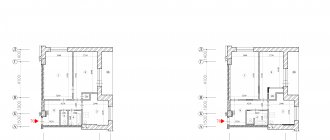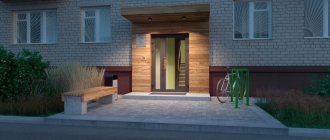Are hotels and mini-hotels public places or not?
According to the Decree of the Government of the Russian Federation of October 9, 2015 N 1085 “On approval of the rules for the provision of hotel services in the Russian Federation,” a hotel is a property complex (building, part of a building, equipment and other property) intended for the provision of services.
A hostel is a mini-hotel for tourists on a small budget. A visitor can rent a separate bed or an entire room (the second option is always more expensive).
Hotels and hostels are not considered public places, as they are private property.
A public place, according to the Administrative Code of the Russian Federation, is a place where strangers may appear: parks, squares, transport stops or offices to which access is not restricted.
What is the difference?
- Hotel premises, unlike hostel rooms, are more spacious and have expensive renovations. The rooms have a separate toilet, bathroom and balcony. The rooms can consist of several rooms and can accommodate up to 5 people. Hotels are located in old mansions or business buildings specially built for them.
- In the hostel, more than 10 people can sleep in one room, and restrooms and showers are located outside the rooms. Often, premises for a hostel are redesigned, since the most common option is a hostel in a large apartment. In Russia there are also chain hostels that occupy individual buildings or entire entrances/floors.
What type of hostel is it?
According to Article 92 of the Housing Code of the Russian Federation, residential premises belong to a special type of housing stock. Issues regarding the transfer of non-residential premises to residential ones are regulated by state or municipal authorities. A hostel is a residential area in which you can live for many years . A person can also register in it.
Kitchen
The kitchen is considered to be a utility room. It is often equated to a balcony. It is used to prepare food, eat food and use it as a place to store food. An exception may be modern studio kitchens, which additionally play the role of a living room or bedroom.
This includes a toilet, corridor and other premises that are also considered non-residential. Thus, the kitchen is a non-residential object, but an auxiliary one .
Hotel
G
A hotel can act as a residential space unsuitable for permanent residence. It is important to pay attention to sanitary, fire and building regulations.
Often these objects are built separately, rather than being built on sites where people previously lived. An exception may be the basement floors. A hotel is considered a non-residential premises; permanent residence is not permitted .
Hostel
By law, a hostel is considered a hostel intended for temporary stay. He cannot occupy living rooms. To install it, you need to remove the apartments from the housing stock, after which a lot of mandatory and necessary operations must be performed.
In essence, these two points are responsible for the peace of the residents of the house, in addition, they guarantee the fact that the stairwells will be clean and comfortable.
According to the new law, you cannot place a hostel in a building that is not intended for housing . Often, too low rental prices attract people who are going to open hostels. But this often indicates that sanitary standards have been violated in the basements, and that some difficulties may arise in the process of arranging a new room.
The ground floor is considered suitable for temporary occupancy of people. It can accommodate showers, a kitchen or a gym. As for the basement, this cannot be done here. Following the above, a hostel is a non-residential premises.
Country house
A country house often acts as a premises in which one cannot live , despite the fact that according to documents it can be registered as residential. Often the building is not suitable for year-round living due to the lack of sewerage, heating and other necessary communications. If all this is present, then such a house is residential.
Apartments
Controversial are those apartments that, in accordance with the order of the ministry, designate a paid room for accommodating visitors.
These are boarding houses, motels, hotels, sanatoriums and other places intended for temporary residence. Apartments that have a bathroom and other communications are considered residential premises . And those in which it is not provided, you can install all the necessary systems in order to then register the property as a housing stock.
Read more: Retirement Calculator for the Far North
What are the requirements for residential buildings in Russia?
Requirements for hotel accommodation remain the same:
- Comfortable and spacious entrances, through passages around the building.
- The premises must be zoned: separately for welcoming and registering guests, separately for rooms.
- If there are retail or service outlets in the hotel building, they must have separate entrances and exits.
Changes await hostel owners: on May 13, 2021, the State Duma adopted in the first reading the Law “On Amendments to Art. 17 of the Housing Code of the Russian Federation,” which was unofficially called the “law banning hostels.” According to this bill, it will be impossible to provide hotel services in residential premises. The rule will apply not only to “apartment” hostels, but, in principle, to any housing and hotels of any kind.
The remaining requirements for opening hostels have not changed:
- rooms should not be located in basements or on ground floors;
- the area per guest must be at least 5 m2, for 6 people there must be at least one washbasin, for 12 guests - one toilet, for 14 guests - one shower;
- bathroom area - at least 1.5 m2 for a combined one, at least 1 m2 for a separate one;
- ceiling height - from 2.1 to 2.5 m;
- the floor and walls must be covered with non-toxic materials;
- There must be fire-fighting equipment in the room.
Signs and features
The residential premises have the following signs::
- It is isolated from others.
- Recognized as real estate.
- Recognized as suitable for habitation.
- Suitable for permanent residence of people and their registration.
The signs of non-residential premises can be represented as follows::
Materiality and isolation. Such an object is considered completely isolated. It has a floor, ceiling, walls, and a separate entrance.- It refers to real estate in accordance with Federal Law No. 122-FZ. The documents include the right to a building or structure, as well as the right to own it.
- Real estate is part of a particular building.
- The location has a connection with the property, which is manifested in registration at a specific address and on a given land area.
- The premises are a non-residential property. The totality of real estate of this type includes objects that are located in non-residential buildings. The exception is those classified as housing stock.
- The functional meaning is as follows: the premises are not suitable for permanent residence of people, but can be used for industrial and public purposes.
How to choose a location and prepare documents for opening?
The best place for a hostel is the city center. For example, in the historical center of St. Petersburg, mini-hotels are in great demand because all important architectural and museum sites are within walking distance.
It is also important that there are bus stops or a train station near the hostel. For tourists traveling by car, parking and convenient access to the building are important. The interior decoration of the hostel must comply with the basic rules in the hotel business: cleanliness, silence, comfort.
To register real estate for a hostel, you will need the following package of documents:
- Permission from the fire service to ensure that the premises comply with fire safety standards.
It is possible that the hostelier will be asked to saturate the floor and roof with a fire-fighting compound and check fire entrances and exits. - Certificate from Rospotrebnadzor. The premises must fully meet the requirements of the sanitary and epidemiological service.
- Certificate from the tax office of registration.
- Garbage removal agreement.
- A document that confirms that the size of the room complies with GOST for one person.
- A lease agreement for premises or a certificate of ownership of the premises.
Error 404
A room is recognized as a part of a residential building or apartment intended for use as a place of direct residence of citizens in a residential building or apartment. Commentary on Article 16 1. It so happens that the concept of “residential premises” is used in a broad sense. It covers not only living rooms, but also auxiliary areas (entrance hall, corridor, kitchen, bathroom, dressing room, toilet, etc.). This is a generic concept. Residential premises include all objects named in part 1 of the commented article. But it follows from this that there are no other living quarters. It is impossible to recognize (from the point of view of the residential complex) a yurt, yaranga, prefabricated house, trailer, beams, etc. as residential premises. This means that the Housing Code of the Russian Federation does not regulate relations regarding the use of these objects. 2. For housing law, the definition of what is a residential house, apartment or room is not of great importance. This is rather necessary for maintaining state records of the housing stock and for state registration of rights to residential premises (see Article 18, Parts 4 - 5 of Article 19 of the Housing Code and relevant comments). 3. Having defined the concepts of “residential building”, “apartment” and “room”, the Housing Code of the Russian Federation is silent about what should be understood as part of a residential building (clause 1, part 1, article 16) and part of an apartment (clause 2, part 16). 1 Article 16 LCD). Apparently, several rooms of this house or apartment, which are the object of housing rights, should be considered part of a residential building or apartment. It is also possible that housing rights may arise over non-insulated parts of a residential building or apartment - in particular, when concluding a sublease agreement and moving in temporary residents.
How to organize a mini-hotel in an apartment: instructions
To organize a pleasant hostel that will always be in demand among tourists, you need to follow this path:
- Choose a place and room.
- Register a business.
- Rearrange the premises and bring in furniture. I recommend choosing high-quality beds, since hostels are most often rented for the sleeping space.
- Invite staff to work: manager, administrator (with good English), maid, plumber, electrician, security guard. There should also be a marketing department, a reservation department and an accounting department.
- Invest money in advertising.
The future owner should also keep in mind that with the adoption of the Federal Law “On Amendments to Art. 17 Housing Code of the Russian Federation,” hostels can only be opened in non-residential premises: in individual non-residential buildings or in apartment buildings that have been converted to non-residential premises.
To transfer an apartment to non-residential, the following rules must be observed:
- The apartment is located on the first floor. If it is higher, there should be non-residential premises below it.
- There is a separate entrance to the premises (not through a common entrance) or it can be arranged.
- There are no people registered in the apartment and no one lives in it.
- The building is not in emergency condition.
To transfer an apartment to non-residential use, there is no need to obtain the consent of all residents. This will need to be done only if the owner wants to make an extension to it or dismantle the balcony.
Documents for transfer of housing
The standard procedure for transferring residential premises to non-residential premises involves collecting documentation. The package of documents includes:
- floor plan;
- technical certificate;
- a certificate from the fire service, Rospotrebnadzor and DEZ (directorate of the single customer), which deal with the organization of work on servicing the housing stock;
- a document confirming that the owners of the apartment building agree to add an extension to the building or dismantle the apartment balcony (if necessary);
- redevelopment project;
- a document confirming the absence of residents registered in the apartment;
- a certificate from the BTI about the cost of transferring the premises;
- a document confirming the registration of ownership.
Premises larger than 100 m2 must be equipped with an emergency exit.
The hostel must comply with fire safety and sanitary standards, the owner will have to enter into contracts with service companies (for cleaning, garbage removal, routine disinfection, etc.), and employees must keep a migration log and enter data about foreign guests there.
What taxes do you need to pay?
Any business, including hotels, needs to register and pay taxes. The future owner can become a legal entity - LLC or remain an individual and register an individual entrepreneur.
The hostel owner can pay tax under the simplified taxation system if the annual revenue from the business is no more than 64 million rubles.
To understand whether the simplified tax system is profitable or not, you need to draw up a business plan and understand approximate income and expenses. Then you need to calculate profitability: divide profit by revenue.
“Simplified income” is recommended to be used if the profitability is more than 40%. The tax amount will be 6%. If the profitability is less than 25%, you can use a simplified “income minus expenses” system. The tax in this case will be 15%.
Differences between them
Real estate is often divided into residential and non-residential.
Residential premises include premises in which people legally live. These are dormitories, apartment and private houses, a summer house, a garden house. Also, almost all types of hotels are considered to be residential.- As for non-residential property, it is often used for commercial or public purposes. The need to transfer housing from one fund to another may arise both from entrepreneurs and from other people who want to use the space to create an office.
If you have such a need, do not sound the alarm again.







